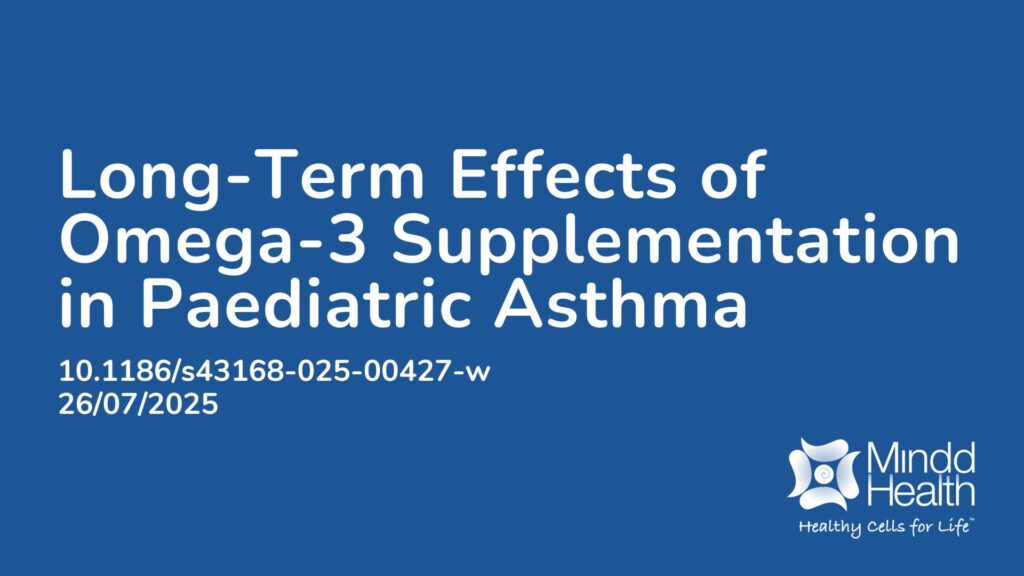Summary:
Asthma is a chronic disease that causes airway inflammation, leading to breathing difficulties and frequent hospital visits. Its increasing prevalence is linked to genetics, environmental exposures, socioeconomic factors, and diet. Oxidative stress, caused by an imbalance between free radicals and antioxidants, contributes to airway damage, inflammation, and worsening asthma symptoms. Diet and nutrition are increasingly recognized for their role in asthma management. Certain nutrients can improve lung function, reduce inflammation, and help prevent asthma attacks. Omega-3 polyunsaturated fatty acids, mainly found in fish oils, can influence cell signaling, gene expression, and the production of inflammatory compounds. This study investigated whether omega-3 supplementation could reduce asthma severity and improve clinical outcomes in children and adolescents. A total of 116 participants aged 6-17.6 years were randomly assigned to receive either 1200 mg of omega-3 daily or a placebo for six months, alongside their usual medications. Participants were evaluated at baseline, after six months, and six months after stopping supplementation. After six months, children receiving omega-3 showed significant improvements in asthma severity, lung function, and inflammatory and oxidative stress markers compared with the placebo group. Moderate and severe asthma cases decreased from 76.7% to 26.7%, and poorly controlled asthma dropped from 100% to 17.8%. Improvements persisted six months after stopping supplementation, although at a reduced level. The results suggest that omega-3 supplementation may be a useful complementary therapy in paediatric asthma, helping to reduce disease severity, improve lung function, and lower inflammation.
Abstract:
Background: Non-compliance with inhaled corticosteroids in pediatric asthmatics is common and can lead to worsening airways and even systemic inflammation. Therefore, complementary strategies alongside pharmacological treatment, such as certain nutrients and dietary patterns, may offer easy and acceptable approaches to mitigate inflammation and alleviate asthma manifestations. The current work aimed to explore the protective effects of omega-3 polyunsaturated fatty acid supplements in asthmatic children and adolescents. Methods The current longitudinal, prospective, double-blind, controlled study included 116 children and adolescents with asthma, ranging in age from 6 to 17.6 years, randomly assigned into two age- and sex-matched groups. Over 6 months, in addition to their regular controller medications, 56 participants received 1200 mg of omega-3 supplement, while 60 received a placebo. The participants were evaluated at the beginning of the study, after 6 months of supplementation, and 6 months after discontinuation, using asthma severity grading, a childhood asthma control test (C-ACT), and pulmonary function tests (PFTs), in addition to measurements of antioxidant and inflammatory markers (glutathione reductase [GR], malondialdehyde [MDA], matrix metalloproteinase-9 [MMP-9], and interleukin-17 [IL-17]). Results: In the omega-3 group, asthma severity grades, C-ACT scores, PFTs, and serum levels of GR, MDA, MMP-9, and IL-17 significantly improved after 6 months of supplementation in comparison to the placebo group (p < 0.001 vs. baseline; p < 0.001 vs. placebo). Specifically, moderate and severe asthma cases declined from 76.7 to 26.7%, while not well-controlled and very poorly controlled asthma decreased from 100 to 17.8%. Improvements were significantly maintained, albeit to a lesser extent, for 6 months after discontinuation, with moderate and severe asthma cases remaining at 37.5% and not well-controlled and very poorly controlled asthma at 33.9% (p < 0.001 vs. baseline; p < 0.001 vs. placebo). Adverse effects were reported in 32.1% of the omega-3 group, primarily fishy burping (26.8%) and mild gastrointestinal symptoms (5.4%). Conclusion: Omega-3 supplementation may serve as a promising adjunct therapy in asthma management, potentially reducing severity, enhancing control, improving lung function, and lowering inflammatory markers in pediatric asthma patients.
Article Publication Date: 26/07/2025
DOI: 10.1186/s43168-025-00427-w



